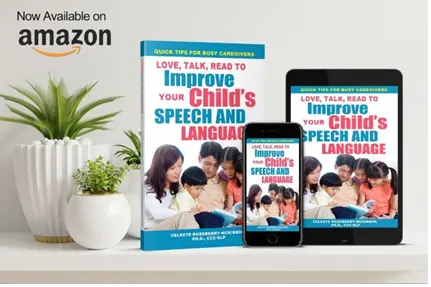Boosting Our Children’s Speech and Language Skills for a Brighter Future
Building Your Child's Language and Literacy Skills: Expert Tips for a Successful Future

We all want our children to be successful in life. And by building their speech, language, and literacy skills from an early age, we can create a brighter future for them!
Here are some easy techniques to build our children’s language skills. They can be used by anyone, anywhere, any time.
From infancy, respond immediately when they communicate. For example, if they make a noise, we can respond by making a noise right back. If they point, we respond right away to what they are pointing to. If they talk, we talk right back! Research out of the U.S. and Sweden tells us that the faster we respond to our children’s attempts to communicate, the faster their speech and language skills develop. Add verbal extensions to children’s words. If they say “doggy,” we can say “Yes, that’s a big, black dog wagging his tail.” Adding verbal extensions works wonders for quickly building spoken language skills; these extensions can easily be worked into our daily routines such as diaper changing, meals, driving around in the car, and bath time. Talk to our children constantly.
It is never too early to start reading—we can begin the day the baby is born. Books should have bright, colorful pictures and not too much print on one page. Get sturdy books that babies can chew, handle, touch, and even throw. Children need to see the adults around them enjoying reading.
Children do what their role models do. If you are glued to your phone, your child will want the phone. If he sees you enjoying reading books, he will be excited about reading as well. Digital books are distracting—most experts highly recommend paper or print books for babies, toddlers, and preschoolers. Keep your young child away from screens as much as possible!
Make reading exciting and fun by using silly, dramatic voices. Be expressive! This is especially important for young children with limited attention spans. Read books your child is especially interested in.
Make reading a priority. Bedtime stories are especially good because they help children wind down and relax. Make it a special time of snuggling before they go to sleep. Sometimes children will want the same book over and over. That’s fine. Don’t be afraid to read the same book repeatedly. When children hear the same book read over and over, they capture the story line and are able to focus on more sophisticated details such as meanings of vocabulary words each time the story is re-read. When reading, help your child figure out new vocabulary. Encourage your child to look at illustrations and pictures to figure out new words, but do supply the meaning if she starts getting frustrated.
Take your child to the local library. Our local library had a sign-up sheet where you could register to read for a half hour with Delilah the dog. My son Mark just loved reading with this therapy dog, and it was very helpful in the early years when he was struggling with dyslexia. I can see him like it was yesterday, snuggled up with the dog in the children’s reading corner. If this is at all available in your neighborhood, I can think of no more positive way than to introduce joy into the reading process. Check your local public library to see what free resources are available. You might be surprised by how much libraries have to offer.
A great way to help your child learn to love reading is to provide books that are funny. Children love to laugh! I’ve mentioned that when Mark was little, he loved Dav Pilkey’s books like the Captain Underpants and the Dumb Bunny series. Even when he struggled with reading due to his dyslexia, I would read the books out loud and use funny voices. This helped him associate positive emotion with reading, even when it was so hard for him.
I’ll never forget the words of Owen, a child with special needs that I served as a speech-language pathologist in the schools. He told me that reading was so hard that he didn’t want to do it anymore. “But my mom bought me some funny books, and it made me want to read again.” Bingo! I bought Owen a Captain Underpants book for him at the school book fair, and he was just thrilled. Humor works!
In summary, to build our children’s speech, language, and literacy skills for a brighter future, respond immediately to their attempts to communicate. Add words to what they say. Read with our children as much as possible. Use funny books and add humor. Make reading a fun, positive experience. This will build those early pre-literacy skills, giving your child the edge for years to come.
Celeste Roseberry-McKibbin, Ph.D., CCC-SLP
Professor, Communication Sciences and Disorders, Sacramento State University
Amazon international bestselling author, Love Talk Read to Improve Your Child’s Speech and Language: Quick Tips for Busy Caregivers
Global TEDx speaker
Tik Tok @celeste.roseberry
Instagram @dr.celeste.roseberry


